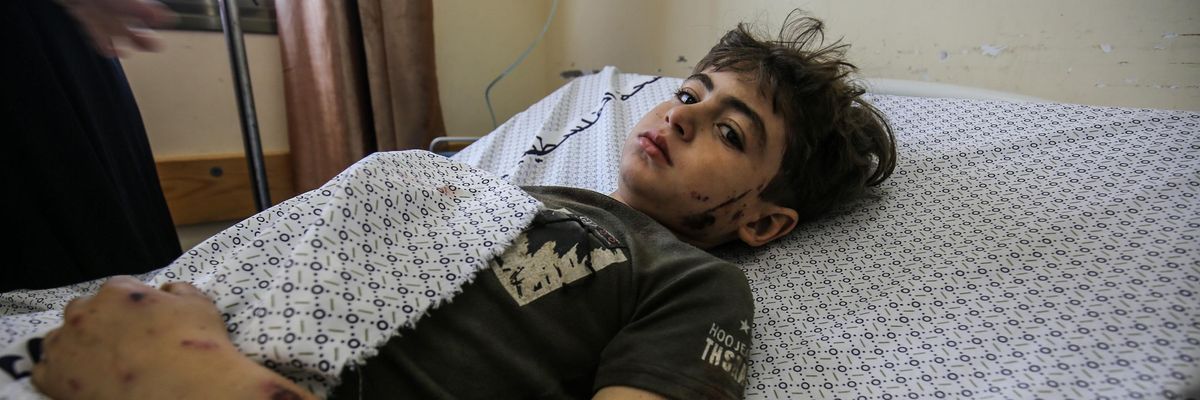As Israel's bombardment of the occupied Gaza Strip continued Thursday in the midst of the Covid-19 pandemic, United Nations leaders reiterated calls for a cease-fire and, until an agreement is reached, a "humanitarian pause" so that aid workers can provide essential supplies and transport out patients in critical need of care.
"The health system, which faces shortages even when there's no bombing, is out of key materials to treat the injured such as blood bags."
--Ely Sok, MSF
Before reports of a possible cease-first starting Friday, United Nations Secretary-General Antonio Guterres addressed the "dangerous and horrific surge in deadly violence" over the past 10 days--which has killed over 200 Palestinians, including dozens of children, along with 12 Israelis--in remarks to the U.N. General Assembly.
Guterres said he is "deeply shocked" by the Israel Defense Forces' ongoing air and artillery bombardment of Gaza, while also calling the "continued indiscriminate firing of rockets by Hamas and other militant groups" toward Israel "unacceptable." He declared that "the fighting must stop immediately," urging a cease-fire.
That demand was echoed at a Thursday press briefing for the World Health Organization's Regional Office for the Eastern Mediterranean.
"The fighting must stop immediately," and until a cease-fire is reached, "all parties to the conflict must agree to a humanitarian pause to ensure access into and out of Gaza for humanitarian staff and critical goods," said Dr. Rik Peeperkorn, head of the WHO Office for the West Bank and Gaza.
The "prevailing insecurity" is preventing much-needed supplies and personnel from reaching Gaza, Peeperkorn explained. "We are ready," he added, to deliver a "huge convoy of essential humanitarian cargo" to Gazans, and to "get patients out and get humanitarian personnel in."
Dr. Ahmed Al-Mandhari, WHO's regional director, said during the briefing that "the escalation of violence in the occupied Palestinian territory has resulted in a substantial number of fatalities and casualties, as well as significant damage to many health facilities."
As Common Dreams reported earlier this week, the recent escalation in violence had led to the deaths of multiple key doctors in Gaza, further straining a health system that was already stressed by the blockade that Israel and Egypt have enforced since 2007.
Impacts of Israel's current assault on Gaza include "the almost total destruction of Hala Al Shawa primary care clinic and substantial damage to the central testing laboratory for Covid-19 at Rimal clinic in Gaza City," said Al-Mandhari.
He continued:
In the Gaza Strip, the severity of injuries is straining an already overwhelmed health system that is facing critical shortages of essential medicines and supplies while also battling the Covid-19 pandemic. Closure of entry and exit points for patients and humanitarian health teams, and severe restrictions on the entry of medical supplies, is exacerbating this public health crisis.
In the West Bank, there has been obstruction of medical teams to accessing casualties, beating, and injuring of healthcare workers, damage, detention and confiscation of ambulances, and incursion into health facilities.
"Healthcare staff working under already challenging conditions and with limited resources should not have to live in fear of these attacks," Al-Mandhari added. "Attacks against healthcare facilities and staff should be a red line for any conflict; they should not be targets--nor should they be impacted by so-called 'collateral damage.' WHO calls for the immediate cessation of hostilities and an end to attacks that either directly or indirectly impact healthcare in the occupied Palestinian territory."
The WHO is a specialized agency of the United Nations. While Guterres is among the world leaders who have advocated for an immediate cease-fire, the United States has blocked a U.N. Security Council resolution calling for one.
In a Wednesday phone call, U.S. President Joe Biden told Israeli Prime Minister Benjamin Netanyahu that he expected "a significant de-escalation today on the path to a cease-fire." After the call, Netanyahu said that he was "determined to continue" the operation in Gaza "until its aim is met."
According to Israeli newspaper Haaretz, "Hamas sources told Lebanese newspaper Al Akhbar the Palestinian group has agreed to a cease-fire, which would go into effect on Friday morning." The Thursday report noted that "the cease-fire would not be unilateral," as Netanyahu proposed, "but rather be binding for both Israel and Hamas."
Meanwhile, Medecins Sans Frontieres, also known as MSF or Doctors Without Borders, was again denied permission to enter Gaza from Israel, said Ely Sok, head of mission in the occupied Palestinian territories, in a statement Thursday.
"The humanitarian needs are mounting, with more than 1,400 people injured and tens of thousands of people displaced. The health system, which faces shortages even when there's no bombing, is out of key materials to treat the injured such as blood bags," Sok said. "The crossing points need to be reopened immediately and safe passage must be facilitated for humanitarian staff and supplies to avert a greater catastrophe."
Aymen Al-Djaroucha, a Palestinian who has lived in Gaza for 20 years, currently serves as a project coordinator for MSF.
"I experienced the Israeli offensives that have taken place since then, those of 2008 and 2014, but the military operation that we are living through today is a lot tougher and more terrifying than anything we knew previously," Al-Djaroucha said Wednesday.
An Israeli attack a few days ago near the MSF office in Gaza "caused dozens of deaths," he said. "The screams of the men and women in the middle of the night, it was terrifying. Our clinic was also damaged that same night during the Israeli bombing."
"The injured have fractures and wounds caused by shrapnel from the bombs and shells," Al-Djaroucha added. "There are a lot of needs now, especially in surgery and intensive care. The patients are women, men, children: no one is spared."

